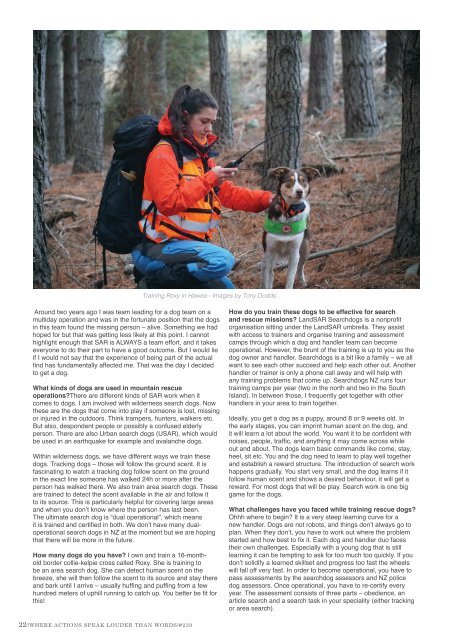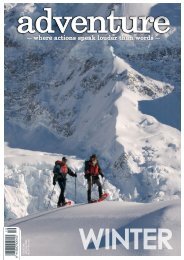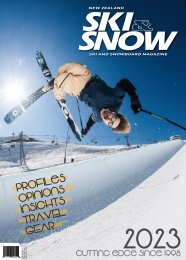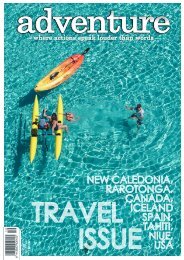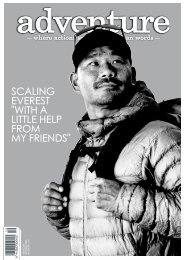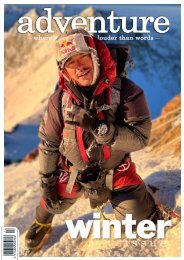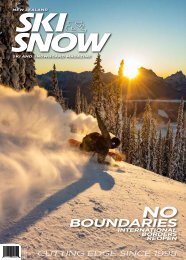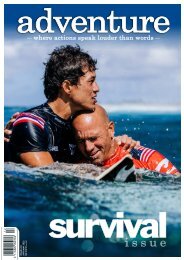Adventure Magazine
Issue 239 - Celebrating women
Issue 239 - Celebrating women
Create successful ePaper yourself
Turn your PDF publications into a flip-book with our unique Google optimized e-Paper software.
Training Roxy in Hawea - Images by Tony Dodds<br />
Around two years ago I was team leading for a dog team on a<br />
multiday operation and was in the fortunate position that the dogs<br />
in this team found the missing person – alive. Something we had<br />
hoped for but that was getting less likely at this point. I cannot<br />
highlight enough that SAR is ALWAYS a team effort, and it takes<br />
everyone to do their part to have a good outcome. But I would lie<br />
if I would not say that the experience of being part of the actual<br />
find has fundamentally affected me. That was the day I decided<br />
to get a dog.<br />
What kinds of dogs are used in mountain rescue<br />
operations?There are different kinds of SAR work when it<br />
comes to dogs. I am involved with wilderness search dogs. Now<br />
these are the dogs that come into play if someone is lost, missing<br />
or injured in the outdoors. Think trampers, hunters, walkers etc.<br />
But also, despondent people or possibly a confused elderly<br />
person. There are also Urban search dogs (USAR), which would<br />
be used in an earthquake for example and avalanche dogs.<br />
Within wilderness dogs, we have different ways we train these<br />
dogs. Tracking dogs – those will follow the ground scent. It is<br />
fascinating to watch a tracking dog follow scent on the ground<br />
in the exact line someone has walked 24h or more after the<br />
person has walked there. We also train area search dogs. These<br />
are trained to detect the scent available in the air and follow it<br />
to its source. This is particularly helpful for covering large areas<br />
and when you don’t know where the person has last been.<br />
The ultimate search dog is “dual operational”, which means<br />
it is trained and certified in both. We don’t have many dualoperational<br />
search dogs in NZ at the moment but we are hoping<br />
that there will be more in the future.<br />
How many dogs do you have? I own and train a 16-monthold<br />
border collie-kelpie cross called Roxy. She is training to<br />
be an area search dog. She can detect human scent on the<br />
breeze, she will then follow the scent to its source and stay there<br />
and bark until I arrive – usually huffing and puffing from a few<br />
hundred meters of uphill running to catch up. You better be fit for<br />
this!<br />
How do you train these dogs to be effective for search<br />
and rescue missions? LandSAR Searchdogs is a nonprofit<br />
organisation sitting under the LandSAR umbrella. They assist<br />
with access to trainers and organise training and assessment<br />
camps through which a dog and handler team can become<br />
operational. However, the brunt of the training is up to you as the<br />
dog owner and handler. Searchdogs is a bit like a family – we all<br />
want to see each other succeed and help each other out. Another<br />
handler or trainer is only a phone call away and will help with<br />
any training problems that come up. Searchdogs NZ runs four<br />
training camps per year (two in the north and two in the South<br />
Island). In between those, I frequently get together with other<br />
handlers in your area to train together.<br />
Ideally, you get a dog as a puppy, around 8 or 9 weeks old. In<br />
the early stages, you can imprint human scent on the dog, and<br />
it will learn a lot about the world. You want it to be confident with<br />
noises, people, traffic, and anything it may come across while<br />
out and about. The dogs learn basic commands like come, stay,<br />
heel, sit etc. You and the dog need to learn to play well together<br />
and establish a reward structure. The introduction of search work<br />
happens gradually. You start very small, and the dog learns if it<br />
follow human scent and shows a desired behaviour, it will get a<br />
reward. For most dogs that will be play. Search work is one big<br />
game for the dogs.<br />
What challenges have you faced while training rescue dogs?<br />
Ohhh where to begin? It is a very steep learning curve for a<br />
new handler. Dogs are not robots, and things don’t always go to<br />
plan. When they don’t, you have to work out where the problem<br />
started and how best to fix it. Each dog and handler duo faces<br />
their own challenges. Especially with a young dog that is still<br />
learning it can be tempting to ask for too much too quickly. If you<br />
don’t solidify a learned skillset and progress too fast the wheels<br />
will fall off very fast. In order to become operational, you have to<br />
pass assessments by the searchdog assessors and NZ police<br />
dog assessors. Once operational, you have to re-certify every<br />
year. The assessment consists of three parts – obedience, an<br />
article search and a search task in your speciality (either tracking<br />
or area search).<br />
22//WHERE ACTIONS SPEAK LOUDER THAN WORDS/#239


